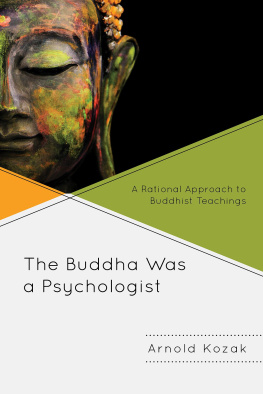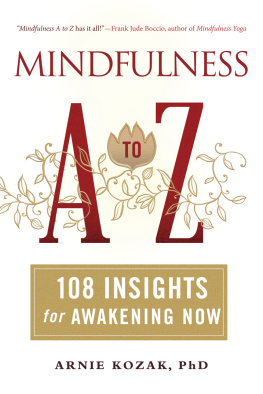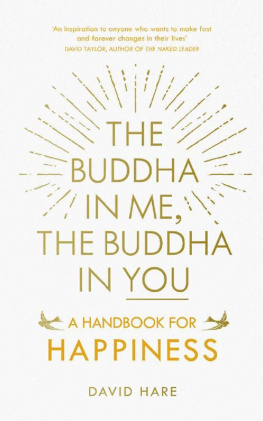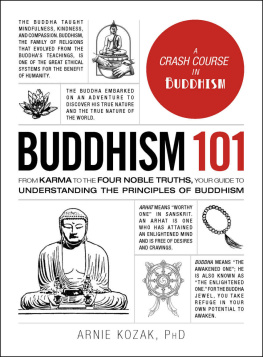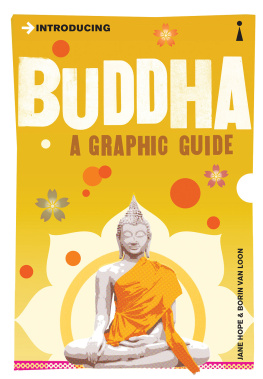The Buddha Was a Psychologist
The Buddha Was a
Psychologist
A Rational Approach to
Buddhist Teachings
Arnold Kozak
LEXINGTON BOOKS
Lanham Boulder New York London
Published by Lexington Books
An imprint of The Rowman & Littlefield Publishing Group, Inc.
4501 Forbes Boulevard, Suite 200, Lanham, Maryland 20706
www.rowman.com
6 Tinworth Street, London SE11 5AL, United Kingdom
Copyright 2021 The Rowman & Littlefield Publishing Group, Inc.
All rights reserved . No part of this book may be reproduced in any form or by any electronic or mechanical means, including information storage and retrieval systems, without written permission from the publisher, except by a reviewer who may quote passages in a review.
British Library Cataloguing in Publication Information Available
Library of Congress Cataloging-in-Publication Data
Names: Kozak, Arnold, author.
Title: The Buddha was a psychologist : a rational approach to Buddhist teachings / Arnold Kozak.
Description: Lanham : Lexington Books, [2021] | Includes bibliographical references and index.
Identifiers: LCCN 2021010183 (print) | LCCN 2021010184 (ebook) |
ISBN 9781498535427 (cloth) | ISBN 9781498535434 (epub)
Subjects: LCSH: BuddhismPsychology. | PsychologyReligious aspectsBuddhism. | Well-beingReligious aspectsBuddhism.
Classification: LCC BQ4570.P76 K697 2021 (print) | LCC BQ4570.P76 (ebook) |
DDC 294.3dc23
LC record available at https://lccn.loc.gov/2021010183
LC ebook record available at https://lccn.loc.gov/2021010184
 The paper used in this publication meets the minimum requirements of American National Standard for Information SciencesPermanence of Paper for Printed Library Materials, ANSI/NISO Z39.48-1992.
The paper used in this publication meets the minimum requirements of American National Standard for Information SciencesPermanence of Paper for Printed Library Materials, ANSI/NISO Z39.48-1992.
Contents
Buddha. The name cannot be uttered without conjuring exotic associations: ancient, wise, Asian, sainly, and religious. For some mistaken few, a statue found in Chinese restaurants comes to mind, a fat, happy figure that is not the actual historical Buddha but the folklore Budai in China. For opportunistic others, Buddha is a trendy marketing icon: the Zen of whatever. For millions of Asian Buddhists, the Buddha was, for all intents and purposes, a godomniscient, superhuman, and spotlessly moral. No matter how multifarious, Buddha almost always represents something religious, spiritual, or both. Almost, but not always. Secular Buddhism seeks to separate him from the religions bearing his name. Buddha, then, takes the form of his representers and their purposessavior, secularistthe words attributed to him can be used to support a multitude of positions. In this book, I present my Buddha, an idiosyncratic, likely fictional, iconoclastic version, influenced by my being a psychologist, one-time spiritual adherent, and current atheistic skeptic.
It is a bit of legerdemain to say that I am secularizing the Buddhas teachings because they already areor appear to be before they were coopted by the religions of Buddhism. My Buddha invented mindfulness but I am not sure what he would think of its current popularity: Flattered? Frustrated? Furious? All of these after a fashion, I imagine. My Buddha was scientifica cognitivebehavioral psychotherapist and an evolutionary psychologistfascinated with how the mind works and dedicated to making life better through better use of awareness, a process that required wisdom, ethics, and meditative training to transcend the dictates of evolutionary programming. and 3) his pedagogical curriculum was geared towards changing instinctual patterns of reactivity selected by evolution. The Buddha as psychologist, then, provides a lens to interpret the current controversies surrounding mindfulness and Buddhismtraditional and otherwiseas they proliferate in the West. At the same time, the anti-metaphysics, pro-responsibility, impulse-changing stance hews away the religious and mystical, leaving a psychotherapeutic project. Rather than cherry-pick passages that make my case, I will own the bias at the outset. I will cite sources that support my view recognizing that there are other sources that present a more religious view. I will not pretend that my interpretations are the true ones but, hopefully, they are compelling and, more importantly, useful ones. Since my Buddha looks like mepsychologist, psychotherapist, yogi, pedagoguemy rendering of him will appeal to people like myself who are secular, scientifically literate, skeptical, and self-reliantpeople who do not like authority, tradition, and dogma, however expertly disguised.

